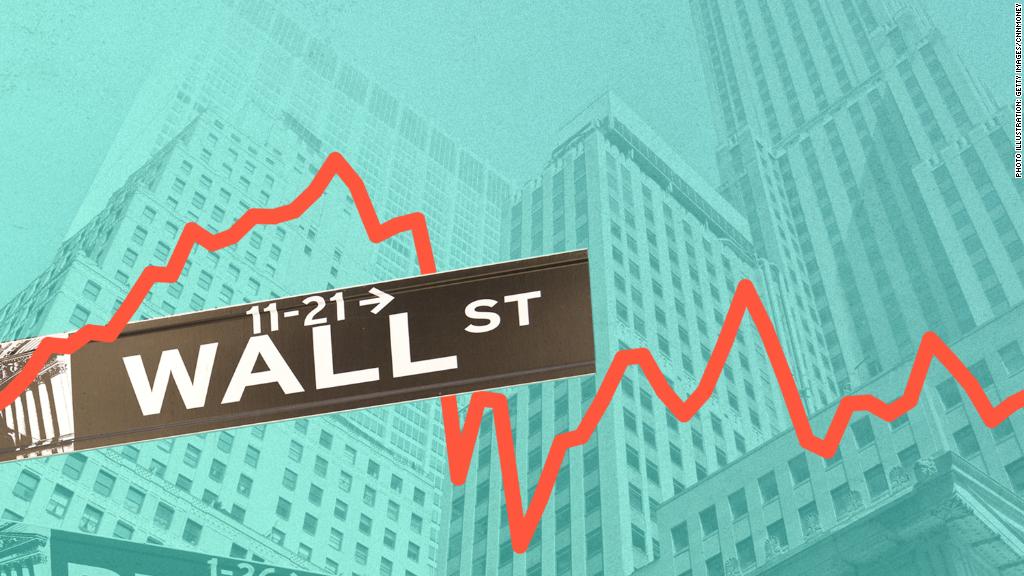
1. The melt-up is over: One of Wall Street's biggest headaches could soon become its saving grace.
The bears growled for months about how expensive stocks became during the euphoria of late last year. And they had a point: Rarely in history have stocks been as pricey as they were during the recent boom.
Yet if there's a silver lining to the recent market chaos, it's that stocks no longer look absurdly overpriced. Heavy selling, driven largely by fears of trade wars and inflation, doused cold water on a market that had been overheating. The melt-up is over.
And that's not just because the Dow has fallen 2,500 points from its high point. It's that the market mayhem failed to shake the confidence of Wall Street.
Earnings estimates, a key indicator of stock prices, almost always decline each quarter as companies manage expectations lower (and then top those expectations anyway). Yet the opposite happened this time as analysts scrambled to assess the benefits of President Trump's corporate tax cuts.
Annual earnings estimates for S&P 500 companies jumped 7.1% during the first three months of the year — the most since FactSet (FDS) began keeping track in 1996. Meanwhile, the S&P 500 itself lost 1.2%.
That one-two combination caused Wall Street's favorite way of gauging stock valuations to drop — significantly.
The S&P 500 is now trading at 16.1 times projected earnings for the next year, according to FactSet. That's down dramatically from 18.6 in late January, when the Dow shot above 26,500. It's also back in line with the five-year average.
"You have to take a step back and look at valuations, which have come down dramatically even as earnings forecasts have gone up," said Mary Ann Bartels, head of portfolio strategy at Merrill Lynch Wealth Management.
Corporate profits, buoyed by Trump's huge tax cuts and a strong economy, are projected to spike 18.5% this year.
Sam Stovall, chief investment strategist at CFRA Research, is "encouraged" by the more reasonable market valuations.
"We believe the correction has likely run its course and is now working its jagged way back to breakeven," Stovall wrote to clients last week.
Of course, valuations are notoriously poor timing tools. Stocks that are pricey can stay that way, and vice versa. Consider how long it took for the market surge of 2017 to take a breather.
The key will be whether Corporate America delivers the blockbuster results that Wall Street is banking on. That would shift the attention away from the increasing turbulence out of Washington.
"We're expecting earnings to be really strong," Bartels said. "If they are, we can finally recover from this correction."
2. Second quarter kickoff: The second quarter is here, and investors are happy to turn the calendar page. The Dow lost more than 2% over the first three months of the year — snapping its longest quarterly streak in 20 years, and marking the worst performance since 2015.
Concerns over inflation caused the market to nosedive in early February. The Dow stabilized after a few volatile days, but has been pulled down more recently by fears of a trade war and a slump in tech stocks.
Related: Stocks finish quarter strong, but Dow snaps longest win streak in 20 years
3. Jobs report: The Labor Department will release the March jobs report on Friday. February's report was strong. The United States added 313,000 jobs, more than economists expected and the biggest gain since 2016. The unemployment rate stayed at 4.1%, the lowest in 17 years.
Investors will be watching wage growth, which slowed a bit in February to 2.6%. Faster than expected wage growth could renew inflation fears on Wall Street and raise the prospect of faster interest rate increases by the Federal Reserve.
Related: Whoa! 313,000 jobs added last month. Here's where they came from
4. Spotify goes public: Spotify is expected to go public on Tuesday. Some analysts are already expecting it to go big.
Mark Mahaney of RBC Capital Markets has set a $220 price target and thinks a $43.5 billion valuation sounds right. That would be five times Spotify's valuation the last time it raised money from private investors.
It would also be a higher market value than Ford (F), Delta Air Lines (DAL) and Target (TGT). Mahaney thinks the business will keep growing around the world as more people buy smartphones.
It's a good time for Spotify to go public. Dropbox (DBX), a cloud storage company, went public last week, and quickly jumped above its offering price. That could signal that investors are looking to snatch up more shares in tech unicorns.
Related: Analyst says Spotify could be worth $43.5 billion
5. Coming this week:
Monday — Manufacturing ISM report
Tuesday — Spotify IPO expected
Wednesday — ADP National Employment Report
Thursday — February trade deficit report
Friday — Jobs report


